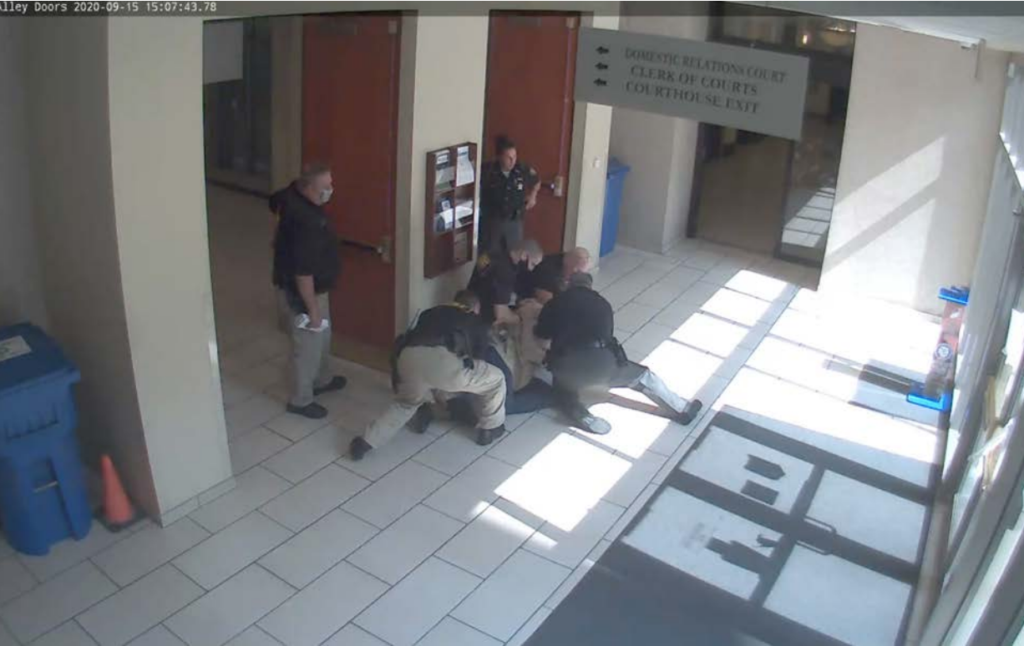Federal court rejects Summit County probate judge’s request for dismissal of civil-rights claims by court worker
This morning, Judge Bridget Meehan Brennan of the U.S. District Court for the Northern District of Ohio issued a 12-page opinion and order denying Summit Count probate judge Elinor Marsh Stormer’s motion for dismissal of the claims against her in a lawsuit filed by a court-appointed social-worker arising from a September 15, 2020 incident at the Summit County Courthouse in Akron.

As Cleveland.com reported last fall, Williams’s complaint alleged that Stormer “argued with and shoved [him] inside the downtown Akron courthouse, leading sheriff’s deputies to tackle and use a stun gun on [him] for walking through an employee entrance at the courthouse.” According to the complaint, Stormer then lied to police investigators that Williams had assaulted her, and police then destroyed surveillance footage of the incident to support a wrongful prosecution of Williams, intending to insulate themselves and the County from liability on an excessive-force claim by Williams.


In her motion to dismiss the claims against her, Judge Stormer argued that her alleged actions were taken in her capacity as a private citizen, not “under color of state law,” thereby absolving her from liability for violating Williams’s federal constitutional rights. Stormer also argued that Williams’s malicious prosecution claim against her under Ohio state law must be dismissed because, according to Stormer, there was probable cause to charge Williams with assault, trespass, and disorderly conduct.
The Court rejected both of Judge Stormer’s arguments.
As to the federal claims, the Court held that Williams alleged conduct that constitutes “quintessential state action.” As alleged in the complaint, “Stormer did not merely report a rule violation,” the Court noted, but rather “physically endeavored to enforce a policy which she apparently believed prohibited Williams’ entry through the courtyard door.” “That Stormer did not identify herself as a judge or act in a typical judicial role” during this incident was irrelevant, the Court held, because “the law does not require that the Defendant be acting on behalf of the state under the state’s authority.” “Indeed,” the Court noted, “most constitutional violations occur when officials abuse, overreach, or act outside their official authority.” Further, the Court held that “[t]he allegations described a state employee who purportedly enforced a government policy to prevent access to a government-owned building and then directed other government-employed personnel to apprehend someone deemed to be in violation of that policy. To the extent the Complaint alleged that Stormer could not have acted in the same manner without the authority of her office, that itself would show state action under controlling precedent.”
As to the state-law claim for malicious prosecution, the Court held that Williams adequately pleaded “false or misleading statements made by Stormer not only before his arrest but also afterward,” “that Williams was prosecuted based on the false accusation that he physically assaulted Stormer,” and that “six months later Stormer continued to play a role in decisions regarding his prosecution.”
As a result of today’s order, the case will now proceed to discovery against all of the named Defendants, including Judge Stormer and the police officers who destroyed and falsified evidence in aid of the malicious prosecution against Williams.
Click here to view a copy of Judge Brennan’s order denying Judge Stormer’s motion to dismiss
Click here to view a copy of the filed complaint
Click here to view a September 19, 2022 report on this case at Cleveland.com
Click here to view an additional comment on this case by the Pattakos Law Firm
